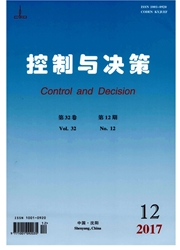

 中文摘要:
中文摘要:
轮式移动机器人现有的避障控制方法大多需要在避障过程中进行减速处理,会影响移动效率。鉴于此,将生存理论应用于轮式移动机器人的反应式避障控制。分析非完整约束轮式机器人的仿射非线性系统模型和约束条件,利用弹性边界升维和控制模型退化的方法给出系统的生存性设计,并利用最优化方法得出机器人高速避障控制器。最后通过仿真实验,表明了轮式机器人高速避障控制的有效性。
 英文摘要:
英文摘要:
Most obstacle avoidance control methods of the wheeled mobile robot(WMR) need to decelerate during the navigation, which affects the movement efficiency. The viability theory is used to WMR obstacle avoidance reactive control. Firstly affine nonlinear system model and constraints of WMR with non-homonymic constraint are analyzed. Then, by using the elastic boundary rising dimension and degradation of control model method, the system viability design is given. The optimization method is applied to the obtained controller of the robot for high-speed obstacle avoidance. Finally, simulation experiments show the effectiveness of the high speed WMR obstacle avoidance method.
 同期刊论文项目
同期刊论文项目
 同项目期刊论文
同项目期刊论文
 A Hermitian least squares solution of the matrix equation AXB = C subject to inequality restrictions
A Hermitian least squares solution of the matrix equation AXB = C subject to inequality restrictions A new simultaneous subgradient projection algorithm for solving a multiple-sets split feasibility pr
A new simultaneous subgradient projection algorithm for solving a multiple-sets split feasibility pr Speed Optimization Control for Wheeled Robot Navigation with Obstacle Avoidance Based on Viability T
Speed Optimization Control for Wheeled Robot Navigation with Obstacle Avoidance Based on Viability T On the Convergence of Central Path and GeneralizedProximal Point Method for Symmetric Cone Linear Pr
On the Convergence of Central Path and GeneralizedProximal Point Method for Symmetric Cone Linear Pr On the Convergence of Central Path and Generalized Proximal Point Method for Symmetric Cone Linear P
On the Convergence of Central Path and Generalized Proximal Point Method for Symmetric Cone Linear P Convergence of an algorithm for the split common fixed-point of asymptomatic quasi-nonexpansive oper
Convergence of an algorithm for the split common fixed-point of asymptomatic quasi-nonexpansive oper Portfolio selection problem with Value-at-Risk constraints under non-extensive statistical mechanics
Portfolio selection problem with Value-at-Risk constraints under non-extensive statistical mechanics Local composite quantile regression estimation of time-varying parameter vector for multidimensional
Local composite quantile regression estimation of time-varying parameter vector for multidimensional Bi-extrapolated subgradient projection algorithm for solving multiple-sets split feasibility problem
Bi-extrapolated subgradient projection algorithm for solving multiple-sets split feasibility problem 期刊信息
期刊信息
